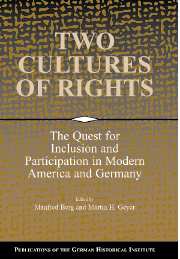Book contents
- Frontmatter
- Introduction
- Part 1 Race, Immigration, and Rights
- 1 Asian Americans: Rights Denied and Attained
- 2 Individual Right and Collective Interests: The NAACP and the American Voting Rights Discourse
- 3 Securing Rights by Action, Securing Rights by Default: American Jews in Historical Perspective
- 4 From Civil Rights to Civic Death: Dismantling Rights in Nazi Germany
- 5 The Rights of Aliens in Germany and the United States
- Part Two Civil and Social Rights
- Part Three Gender, Sex, and Rights
- Index
3 - Securing Rights by Action, Securing Rights by Default: American Jews in Historical Perspective
Published online by Cambridge University Press: 05 January 2013
- Frontmatter
- Introduction
- Part 1 Race, Immigration, and Rights
- 1 Asian Americans: Rights Denied and Attained
- 2 Individual Right and Collective Interests: The NAACP and the American Voting Rights Discourse
- 3 Securing Rights by Action, Securing Rights by Default: American Jews in Historical Perspective
- 4 From Civil Rights to Civic Death: Dismantling Rights in Nazi Germany
- 5 The Rights of Aliens in Germany and the United States
- Part Two Civil and Social Rights
- Part Three Gender, Sex, and Rights
- Index
Summary
The history of Jews as individuals and Judaism as a religious body in America cannot be disentangled from the history of rights. In every era, from the arrival of the first Jews in New Amsterdam in 1654 through the end of the twentieth century, Jewish life in the United States has been deeply influenced by the particular set of rights that Jews enjoyed or to which they considered themselves entitled.
Much of what came to be distinctively American in the lives of American Jews historically flowed from the existence of those rights, which far outstripped those of other Jews in other places. Although it is hardly notable that Jews in the United States expected and received more rights than Jews in Russia or Poland, for example, their benefits as American citizens outstripped those of Jews in most other Western liberal democracies. If nothing else, Jews in the United States did not have memories of a conflicted and tense process of emancipation, such as the Jews of England, France, and especially Germany endured. With some minor exceptions, no state legislature and certainly not the U.S. Congress ever debated the merits or demerits of Jews or their worthiness for inclusion in the polity. English, French, and German Jews did have such memories.
Even the basic nature of American Jewish communal patterns derived from those rights. Because of the nonestablishment clause of the U.S. Constitution's First Amendment, possibly derived from the American reality of religious heterogeneity, the state, broadly defined, did not interfere with the internal affairs of the Jewish community.
- Type
- Chapter
- Information
- Two Cultures of RightsThe Quest for Inclusion and Participation in Modern America and Germany, pp. 59 - 76Publisher: Cambridge University PressPrint publication year: 2002

